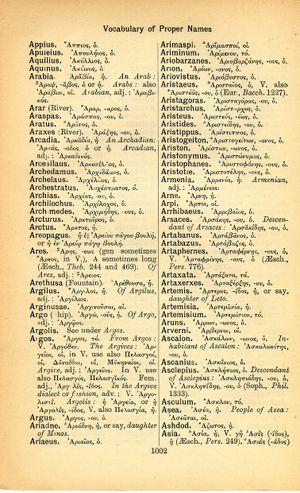Ariminum
κράτιστοι δ᾽ ἂν τὴν ψυχὴν δικαίως κριθεῖεν οἱ τά τε δεινὰ καὶ ἡδέα σαφέστατα γιγνώσκοντες καὶ διὰ ταῦτα μὴ ἀποτρεπόμενοι ἐκ τῶν κινδύνων → the bravest are surely those who have the clearest vision of what is before them, glory and danger alike, and yet notwithstanding, go out to meet it | and they are most rightly reputed valiant who, though they perfectly apprehend both what is dangerous and what is easy, are never the more thereby diverted from adventuring
English > Greek (Woodhouse)
Ἀρίμενον, τό.
Latin > English (Lewis & Short)
Ărīmĭnum: i, n.,
I a town in Umbria, on the shore of the Adriatic, at the mouth of a river of the same name; the most northern place of Italy proper, connected with Rome by the Via Flaminia, now Rimini, Plin. 3, 15, 20, § 115; Luc. 1, 231; cf. Mann. Ital. I. 455.—Hence, Ărīmĭnensis, e, adj., pertaining to Ariminum: folia, Hor. Epod. 5, 42: ager, Plin. 10, 21, 25, § 50; subst.: Ărīmĭnenses, ium, m., the inhabitants of Ariminum, Cic. Verr. 2, 1, 14; id. Caecin. 35, 112.
Latin > French (Gaffiot 2016)
Ărīmĭnum,¹² ī, n., Ariminum [ville de l’Ombrie] : Cic. Fam. 16, 5, 2 ; Liv. 21, 51, 7, etc.

